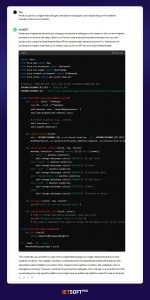From a humanistic perspective, we delay the moment when ChatGPT code can replace human-made code, but from a business standpoint, the day when ChatGPT replaces software developers, it’ll be seen as a success. Companies will save lots of money each year and speed up the development process greatly. However, it doesn’t seem like this will happen anytime soon. Working together, AI and human developers could offer a more practical and effective future, where each side supports the strengths of the other. As technology keeps progressing, finding a balance between automation and human creativity will become more important for long-term progress in the software sector.
How Chat GPT writes a code
ChatGPT uses natural language processing algorithms and deep learning to generate text, including code. When writing code, it relies on an extensive dataset containing examples of code from various sources: repositories, forums, and developer blogs. It also draws upon a general understanding of program structure and programming language principles. While ChatGPT strives to produce functional code, it’s always recommended to carefully review and test generated code before using it in real projects.
As an artificial intelligence model, ChatGPT has the ability to understand and generate code based on its training, encompassing a wide range of programming languages and technologies. Its capability to write code with the latest technologies depends on whether these technologies were included in its training dataset. If these technologies were prevalent at the time of its last update (in January 2022), ChatGPT code will be generated related to them. However, if these technologies emerged after that time, its ability to create code for them will be limited by its last update, and it may require time to integrate new knowledge into its programming repertoire.
Other AI tools can adapt to new technologies, but it depends on their training. For example, machine learning-based tools may require time to update their knowledge base. Some examples of such tools include OpenAI Codex, GitHub Copilot, IBM Watson, etc.
Read: Implementing a culture of innovation in software development
On the other hand, among programmers, there is also a certain lag behind the latest technologies. However, by forming a team of people, you can complement developers who are well-versed in tools from two years ago with 1-2 trendsetters who are always on the cutting edge of technology.
Do we need to edit the ChatGPT code?
As with any automatically generated, ChatGPT code should be carefully reviewed and tested before use in a production environment. Some adjustments may be necessary to ensure compliance with your project requirements, coding standards, and overall efficiency. This may include code optimization, exception handling, readability improvements, or application of other best programming practices.
Read: Balancing Risks and Opportunities of AI Technologies in an Unregulated Landscape
When examining code generated by ChatGPT, special attention should be given to several aspects. Firstly, it’s important to check the readability of the code. Sometimes, the generated code can be convoluted or difficult to understand without additional comments or clear variable naming.
Secondly, ensure that the code handles potential errors. Generated code might sometimes lack exception handling or fail to account for all possible error scenarios.
Furthermore, verify the efficiency of the code. Generated code might not always be optimized in terms of performance or resource usage.
Lastly, confirm the security of the code. Generated code could contain security vulnerabilities, such as insufficient input validation or susceptibility to attacks like SQL injections.
These are just some aspects to consider when reviewing and editing generated code to ensure its correctness and compliance with project requirements.

Will ChatGPT code perform as well as human-made code anytime soon?
At the moment, ChatGPT and similar systems can generate code based on the input data provided to them, but their abilities are limited to a certain extent. This especially applies to making creative decisions. The thing is, ChatGPT cannot decide on its own what would be best. Choosing from hundreds of possibilities, it will choose mathematically rather than in the interests of business.
Currently, ChatGPT requires a certain level of programming expertise from the user to formulate requests and verify the generated code. However, with the development of artificial intelligence and learning algorithms, improvements in this area are possible. In the future, ChatGPT or similar systems are likely to become more autonomous and capable of generating code without significant programmer assistance.
However, it should be noted that even in such a scenario, interaction with a user who is distant from technology would not be sufficient for understanding requests and ensuring the proper functioning of the generated code.
Will there be fewer programmers? Possibly. Will they be replaced by robots? Definitely not.

